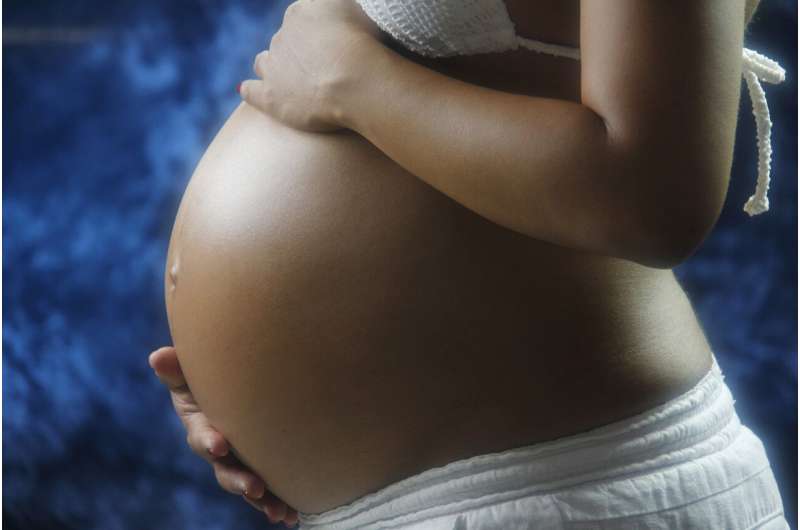
Nina Thomas, 24, is a single mom who lived in Kankakee, Illinois, before COVID-19 upended her life.
Her routine, for nearly four years, included working her night shift job at a Joliet warehouse, and picking up and dropping off her toddler son, Jayden, at the babysitter’s during the week.
“I love being a mom. It’s the greatest thing ever,” she said. “Then when COVID-19 hit, it was like everything got turned upside down—my partner left, the job left, the car almost left. It was hard.”
Thomas was also going through her second pregnancy during it all, and at 22 weeks, she was having some serious issues with housing stability. A former resident of Dolton, she remembered the Family Christian Health Center (FCHC) on the campus of UChicago Medicine-Ingalls Memorial Hospital in Harvey.
“When I came to the office and talked to my doctor, I just started crying,” Thomas said. “The doctor asked what was wrong, and I was like, ‘I’m so stressed out.’ I got this baby with me, and he’s 3, and I don’t want to let him down.” She said she asked for help because she was “scared” and had no support from family members.
“If there was a facility more focused on single moms … going through this journey, a place where people make you feel safe that it is OK to ask for help, I’d go,” Thomas said she thought at the time.
On Feb. 1, such a place will open on the Ingalls hospital campus in Harvey—the Maternal Child Health and Wellness facility (15620 S. Wood St.). And as its name indicates, the space will center on maternal health in an attempt to reduce the alarming rate of maternal mortality in Black women in Illinois.
Health records show that of the 46 million hospitalizations of pregnant or postpartum women between 2007 and 2017, Black women were 45% more likely to die in the hospital, women of color reported more pain postpartum, and yet they receive less opioid medication in the hospital and at discharge, and Black women in Illinois were six times as likely to die of a pregnancy-related condition than white women.
In December, the federal Department of Health and Human Services announced a plan to improve maternal health that includes getting blood pressure under control for 80% of reproductive-age women. Dr. Lisa Green, CEO and co-founder of the Maternal Child Health and Wellness site, hopes the new site will turn the tide. She has worked to improve health care services for Black moms throughout her career and conducted a symposium on the topic in 2020.
Services available at the new center will include preventive care, child and high-risk pregnancy care from OB-GYNs and pediatricians, case managers to help patients navigate the health care system, behavioral health professionals, and “centering,” which brings women into groups for care education and support.
Green wants the Maternal Child Health and Wellness facility to be a one-stop shop for women throughout their lives with family care services such as parenting classes, as well as “wraparound” services to help with housing, food, insurance and financial issues.
“Black women still die more than white women from lack of getting a mammogram,” Green said. “If I’m a high-risk mom and I still have all these other barriers to get care, that risk is even higher. Our goal is to take barriers out.”
Zuri Thompson, a Bronzeville doula who has been providing meals for Black mothers during the pandemic under the hashtag #takeitoffmyplate in partnership with the Chicago Birthworks Collective, said the postpartum period after her daughter was born in 2017 was when she struggled the most. She welcomes social services not being a hindrance to a postpartum mom.
“You survive pregnancy. And then you’re dropped in this completely new paradigm, even if you have support,” Thompson said. “If you’re someone that has to access social services after you have your child, can we not have them stand in line with a newborn baby because they have to go to the Department of Human Services office and fill out paperwork?”
With the assistance of Green and FCHC staff, Thomas is now in a two-bedroom Matteson apartment with her children. (Thomas delivered her daughter, Jhene, safely Aug. 4 at UChicago Medicine-Ingalls Memorial Hospital in Harvey despite high blood pressure throughout the pregnancy.)
“I was so stressed out about everything going on, my blood pressure stayed up,” Thomas said. “They had given me medication for my blood pressure to go down, and they really kept a check on it because they were concerned about her safety as well.”
When the new Maternal Child center opens, Thomas said, she’s “definitely going.”
Dr. Jamie Horn, department chair of OB-GYN at UChicago Medicine-Ingalls Memorial Hospital will be one of five practitioners in the Maternal Child Health space. According to Horn, who’s been with FCHC for 16 years, the new maternal site will meet women where they are—be it the hospital, FCHC or the wellness facility—for continuity of care.
FCHC, which is celebrating its 20th anniversary in April, serves nearly 20,000 patients from 59 ZIP codes annually, according to Green. She hopes to increase the number of patients by 25% with the Maternal Child center.
Green said the new facility, which has all African American doctors on staff, will offer maternal-fetal medicine for high-risk cases shortly before, during and after birth, making it unnecessary to send those patients to other hospitals in the city and reducing travel time for health care. The newly designed space goes beyond the standard open-floor community clinic look, Horn said.
“We are bringing a facility to the area that’s going to be full service for women,” Horn said. “We want people who come to feel welcomed, be listened to, be heard.”
Source: Read Full Article
